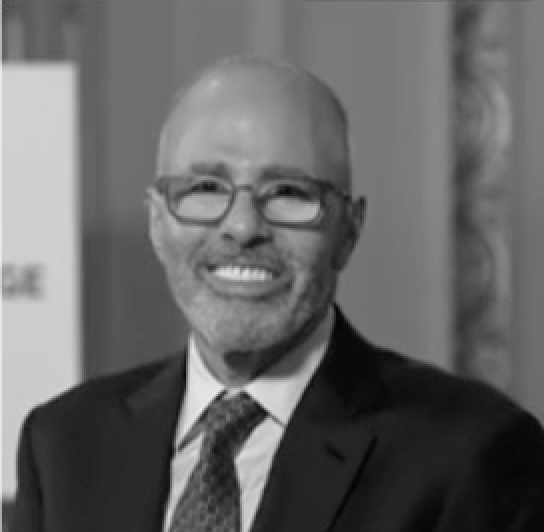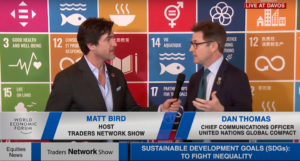Morad Fareed, Michelle Williams, and Fr. Philip Larrey Deliver Humanity 2.0 Lab Discussion at the Vatican | Traders Network Show – Vatican City
Contributed by: Show Editorial Team
Humanity 2.0 Lab Discussion was delivered by Morad Fareed, Fr. Philip Larrey, and Michelle Williams at Humanity 2.0 (Vatican City)
HIGHLIGHTS
- US spends $98 billion in childbirth hospital bills annually
- 2/3 of deaths during childbirth are preventable
- Women living in low income areas across US are 4x more likely to suffer a maternal death than women in high-income areas
FULL COVERAGE
INTERVIEW TRANSCRIPTS: Morad Fareed, CEO of Humanity 2.0 Lab, Fr. Philip Larrey, Chairman of Humanity 2.0, and Michelle Williams, Dean, Harvard T.H. Chan School of Public Health
Rev. Philip Larrey – Chairman, Humanity 2.0: 00:01
Our first presentation will deal with the partnership between DELOS and Humanity 2.0 I’d like to introduce Morad Fareed who is going to speak to us on that issue. He is a cofounder of Delos and currently works as a special advisor on human centered initiatives as managing partner for the company’s first five years, Morad helped build and shape the wellness real estate industry by helping to launch industry leading innovation such as the Well Living Lab at the Mayo clinic and the well building standard. Morad is also the co-founder of Humanity 2.0 and CEO of the Humanity 2.0 Lab based in Rome. This pioneering foundation and lab work with the Catholic church to build institutions that address important human challenges including maternal and infant wellbeing. Recently he created a maternal health scholarship fund at the Harvard TH Chan school of public health named after his parents together Delos and Humanity 2.0 are working on a white paper entitled in advancing human development through healthier environments. A report on improving environmental and human health through science and technology. It’s my honor to introduce Morad Fareed.
Morad Fareed – CEO, Humanity 2.0 Lab: 01:27
So when I tell people what I do here at Humanity 2.0 they look at me funny. I tell them I work in maternal health and they want to know why. They asked me if I had some kind of traumatic experience. They asked me if it’s my passion project because they know how close I am to my mother. And they’re always looking for some narrative that’s very profound and complex. And the truth is it’s so simple and it’s so obvious. The nine months in the womb are the most important time in the universe to every human being, the nine months in the womb shape the rest of every human’s life, the nine months in the womb, and the most important process in humanity right now, we are doing this wrong around the world. Women are dying during pregnancy and two thirds of these deaths are preventable. Think about this for one second. The most important process of humanity. We’re doing it wrong. Women are dying and two thirds are preventable. Doesn’t this bother you?
Morad Fareed – CEO, Humanity 2.0 Lab: 02:40
So I work in maternal health because it’s the work that needs to be done. Still there is something deeper. Maternal health is the most important RD project in the history of the universe. It’s been going on for hundreds of thousands of years. It’s R and D budget is unlimited. An 8 billion humans depend on healthy pregnancy because 8 billion humans came from a mother’s womb. Maternal health is the single greatest determinant of a healthy human being and all of our collective future. And this is why I love this organization. We can look at things existentially and then we can get very tactic. So on maternal health. The only tactical question is this, what is the single most valuable vehicle we could develop to better support pregnant women around the world? This is called the Humanity 2.0 Lab. The goal of the lab is simple, save lives and build healthier humans. That is survive pregnancy and flourish in life. Before we get deeper into this, I’d like to introduce the leader of an organization that’s been essential to our thinking. We’ve engaged six organizations to help us develop a white paper. The leader of one of these organizations. Michelle Williams is the Dean of the Harvard Chan school of public health. I must say, Michelle, your mind share and engagement has saved us about 10 years on this project and we thank you very much for everything you’ve done.
Michelle Williams – Dean, Harvard T.H. Chan School of Public Health: 04:25
Good morning everyone and thank you Morad for that very generous introduction and thank you Matthew for convening this very important meeting with such a formidable group of faith, public and private sector leaders who bring a wide range of perspective to the table on what is, as Morad said, the most important topic on global health and that is maternal health, particularly as it relates to pregnancy and the production of healthy, thriving children who will become adults. As Dean of the Harvard Chan school of public health, I believe that public health is always around us. Elements such as clean water, vaccinations, fresh air, the food we eat are all critical to our ability to thrive and to reach our maximum human potential. Yet most of us take these things for granted. They more or less fade into the background. Of course, until there’s a crisis. It’s only then do we recognize the role of public health in our lives and maternal mortality is nothing short of a crisis that is hiding in plain sight. That’s true in the developing world where 99% of maternal deaths occur, but it’s also true in the most affluent countries in the world, especially the United States of America.
Michelle Williams – Dean, Harvard T.H. Chan School of Public Health: 06:05
It wasn’t always this way. From 1955 to 1985 maternal mortality in the US decreased by 99% a combination of new guidelines for delivery conditions and large scale education efforts gave us one of the greatest public health victories of the 20th century. But around 1990 the maternal death toll began to climb again and by 2013 rates more than doubled. Today, an appalling 700 women in United States die each year from pregnancy or delivery complications more than any other industrialized country in the world. And for every woman who dies in childbirth or in the postpartum period, there are 75 to a hundred more women who suffer life threatening medical complications. Unfortunately, but not unsurprisingly. The risk of such complications are largely defined by race. According to the world health organization, the odds of a black woman surviving childbirth in the United States is one of the richest countries in the world are comparable to those of women in Mexico or Uzbekistan where significant proportions of the population lives in poverty.
Michelle Williams – Dean, Harvard T.H. Chan School of Public Health: 07:35
Black women die at a rate that ranges from three to four times that of their white counterparts. American Indian and Alaskan native women also fare worse than their white counterparts with approximately twice as many pregnancy related deaths per 100,000 life births. The recent harrowing postpartum experiences of a prominent woman like tennis superstar, Serena Williams has shed light on this issue. Following the birth of her daughter in September of 2018 Serena Williams experienced shortness of breath and a strong sense that something wasn’t right. Her doctors, well trained, well intentioned providers, suggested that her pain medication must have caused her to be confused, but few people in the world knew their bodies better than a world class athlete like Serena Williams and she was certain something was wrong and so she didn’t back down. She raised her voice, she insisted on having a CT scan and sure enough that test revealed potentially life threatening blood clots in her lungs and the subsequent surgery found a hemorrhage at the site of her C-section incision.
Michelle Williams – Dean, Harvard T.H. Chan School of Public Health: 09:08
The ordeal left Serena Williams bedridden for the next six weeks, but if she hadn’t been in the position to strongly advocate for herself, she might not have survived at all. Serena’s story is a powerful example of how difficult it can be for women and particularly mothers of color to get the care they need regardless of who they are. We have to reckon with the reality that discrimination on the basis of gender and on race within the healthcare system exists. Research shows a substantial number of healthcare workers exhibit, for example, racial bias in pain assessment and pain management routinely dismissing black women when they raise concerns over their health, but the inequities that affect maternal mortality rates begin long before an expectant mother goes into labor. There are access issues to prenatal care for sure. Women who don’t have access to care are three to four times more likely to suffer a pregnancy related that death than women who do and prenatal prenatal care access largely depends on where you live, what you look like, and your level of access to health information.
Michelle Williams – Dean, Harvard T.H. Chan School of Public Health: 10:38
About a quarter of US women do not receive prenatal care. That’s 25% of us women do not receive prenatal care and that includes a disproportionate number of African American women and native Indian or Alaska native women at the rate of 32% and 41% respectively. Imagine that a third to almost a half not receiving care with this demographic population, they also see far higher rates of noncommunicable diseases like diabetes, anemia, cancer, and obesity, and all of these conditions can contribute to higher rates of complications. In pregnancy and childbirth, social determinants of health, unequal conditions in which we’re living. Where we work, play, contribute also to this disparity. One way is through chronic unrelenting stress or toxic stress like living paycheck to paycheck or amid urban and gun violence, which can lead to a wear and tear on our minds as well as on our bodies. Such stressors contribute to a cascade of adverse health outcomes including heart disease, obesity and stroke.
Michelle Williams – Dean, Harvard T.H. Chan School of Public Health: 12:11
Two of my Harvard Chan colleagues, Karsten Conan and Andrea Roberts are looking at the connections between trauma and physical health using information data collected from the nurses health study, which is a study of over 270,000 nurses followed for decades have compared the rates of type two diabetes, cardiovascular disease and obesity in women with and without post traumatic stress disorder or PTSD, if you will. And what they’ve found was that women with PTSD were twice as likely to suffer diabetes as the general population. These women had a 50% higher likelihood of stroke or heart attack. The work of Harvard Chan school alumnus Arlene Geronimus hones in on the negative impacts of psychological stress on maternal health. Her research has shown that stress hormones staggered triggered by the flight or fight scenarios siphoned off energy from other physical functions including those that support a healthy pregnancy. To quote Arlene Geronimus “living under chronic stress is like facing tigers coming from several directions towards you every single day.”
Michelle Williams – Dean, Harvard T.H. Chan School of Public Health: 13:39
She has coined a term for this corrosive damage weathering and what she’s finding is that the damage only compounds as time goes on. It’s not just women who are affected by stress of study. In the American journal of obstetrics and gynecology also found that stress associated with the daily experiences of racial discrimination can increase the risk of problems such as preterm birth and low birth weight infants. And as you heard from maraud, these conditions contribute to a cascade of adverse events across the entire life course. Everything we are learning about the connections between racial disparities, socioeconomic realities, and our biology reinforces essential fact. And that is improving maternal mortality rates necessitates reducing the stressors around us tackling this issue, particularly in the United States. It’s going to require a systemic creative and sustained approach.
Michelle Williams – Dean, Harvard T.H. Chan School of Public Health: 14:55
To give you an idea of what I mean, I want to talk a bit about some of the incredible work that’s being done by my colleagues at the Harvard Chan school of public health. Take for example the maternal health task force, a project at the school, women and health initiative, which is led by Dr. Ana Langer, who you will be hearing from later this morning. The program works to end preventable maternal mortality by integrating maternal newborn and reproductive health care along a continuum of care. The task force is also committed to educating the public on the issue of maternal mortality in and of itself a service that is sorely needed. Another researcher at our school, David Williams, has been enormously influential in the ways we understand racism and other social determinants of health. He developed the everyday discrimination scale as a way to measure the impact of adverse social interactions. One might think of as inconsequential everyday occurrences like receiving poor services than others in restaurants or stores or witnessing people act as if they’re afraid of you.
Michelle Williams – Dean, Harvard T.H. Chan School of Public Health: 16:14
To hear him say it, the scale captures the way in which the dignity and the respect of people who society does not value is chipped away on a daily basis. Every day discrimination scale is a crucially important tool for collecting data for another very large and important study called the black women’s health study. This study aims to understand the intangible effects of being a black woman in America, the study Chronicles conditions and experiences that might not necessarily touch other communities. The research could eventually help to lead to a broad range of changes in our US healthcare culture, in public health information gathering and in everyday society. Maternal deaths are one of the key indicators of the broad systemic problems and we must be willing to address these problems from a variety of social, behavioral and biomedical angles.
Michelle Williams – Dean, Harvard T.H. Chan School of Public Health: 17:25
That’s part of the reason that I’m so delighted that we are gathered here today. The Humanity 2.0 Lab is ambitious. It is visionary and it is wide ranging in scope as it must be given the importance of the work and the complexity of the work and it’s going to take something bold and forward thinking, not just to solve a crisis as complex as maternal mortality, but to begin chipping away at the broader inequities in health in our country and in countries across the globe. Part of that is going to require remembering that in healthy environment is about more than the physical surroundings. It’s about more than the air we breathe, the water we drink, the food we eat, or the places that we call home. It’s also about quality of lives we live. The nature of our social interactions and the strength of our relationships, our financial security and the kind of support and opportunities that are open to us.
Michelle Williams – Dean, Harvard T.H. Chan School of Public Health: 18:33
All these factors are central to what we call human flourishing. Professor Tyler VanderWeel, director of the human flourishing program at Harvard. Will be talking today about our interdisciplinary approach to this topic in much greater depth later that today and every mother and child, no matter their background, deserves an opportunity to flourish. So a pledge to ensure healthy maternal environment is a pledge to build a more just equitable society and that will lead to a better health outcome for everyone, everywhere. All of us here today have a role to play from training providers to educating communities to opening up about our own experiences with stress and trauma. This forum is a wonderful start to a real testament to our shared vision for a better future for all. So I’d like to begin by thanking you and I’m so delighted to be here and look forward to the work that we are going to accomplish together. Thank you.
For link to original article, click here
All rights reserved to the Traders Network Show. No part of this publication may be reproduced, distributed, or transmitted in any form or by any mean including; photocopying, recording, or other electronic or mechanical methods, without prior written permission of the publisher, except in the case of brief quotations embodied in critical reviews and certain other noncommercial uses permitted by copyright law. For permission requests, write to the publisher addressed “Attention: Permissions Coordinator”








